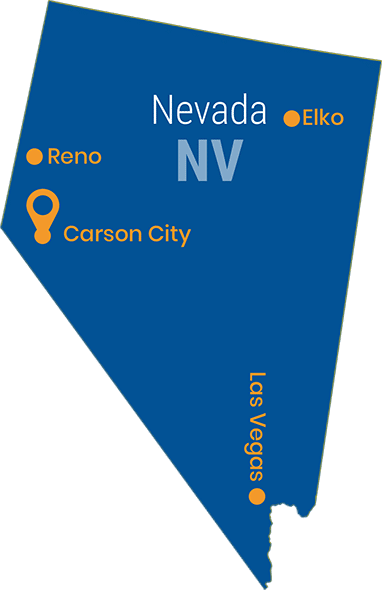What is Information Technology?
Earning a degree in computer information technology can lead to various career opportunities in Nevada. It’s a particularly good major option for individuals interested in and proficient with computers. Prospective computer science students must realize, however, that this area of study is completely distinct from computer science. The two subjects share some similarities, but generally result in very different occupational opportunities. Whereas computer science curriculums focus on the theories and technologies used to design and develop computers and computer programs, information technology programs tend to help students develop the knowledge and skills needed to maintain and troubleshoot computers, networks, systems, and databases.
Notably, job prospects for computer technology professionals are promising. This is largely due to the fact that companies and organizations across numerous industries rely on individuals with computing expertise every day. Opportunities are most prevalent, however, in software development, finance, healthcare, and manufacturing.
This field is vast, with numerous computer information technology occupations available in Nevada and throughout the United States. Companies and organizations in almost every industry depend on these professionals, making it relatively easy to find employment. With so many different opportunities, however, it can sometimes be difficult to pinpoint exactly what these workers do.
Standards and expectations can vary significantly from one job to another, but most professionals in this field are expected to perform tasks associated related to the study, design, development, implementation, support, and/or management of computer-based information systems. Depending on the position, this may entail analyzing technical problems, identifying computer requirements, and/or solving technological issues for others as they arise.
It's also important to realize that computer technology professionals may work in a wide variety of settings. Depending on the position and type of work performed, they may work in small offices, large research facilities, or even move between multiple locations throughout the day. Additionally, there are a decent number of opportunities available for them to work from home. While many are employed by others, some do work for themselves or as independent contractors.

Featured Online Programs
Online Information Technology (IT) Education in Nevada
According to the US Bureau of Labor Statistics (BLS), employment in computer and information technology occupations is expected to increase by 15% from 2021 to 2031. This is much faster than the average of all occupations and will account for approximately 682,800 new jobs in the field throughout the nation. An additional 418,500 openings are expected each year due to the need to replace workers leaving their occupations permanently.
Information is not one of the top industries in Nevada, but the continued need to collect, store, and protect data ensures opportunities will be available in other sectors. Some of the biggest money-making industries in the state include entertainment, real estate, business services, retail, education, healthcare, finance, construction, manufacturing, transportation, and wholesale. All of these are likely to require assistance from computer information technology professionals.
Based on data provided by the BLS, 25,750 computer and mathematical professionals were employed in Nevada as of May 2022. The annual mean wage for these occupations was $87,660, which is significantly higher than the state’s annual mean wage of $55,490 for all occupations.
Nevada has many colleges and universities, many of which offer degrees in computer technology and other related subjects. While it’s also possible to enroll in online programs in other states, this may not be the best option for individuals who intent to seek professional employment in Nevada. Academic institutions located within the state will offer the most geographically relevant instruction. As a result, graduates from these schools typically possess knowledge and skills that meet and/or exceed local employer’s standards and expectations. Some options in the state include the College of Southern Nevada, Great Basin College, the University of Nevada, etc.
Computer information technology is a relatively accessible field, with educational requirements that range from high school diploma or GED to a doctorate degree. While entry-level positions do exist for individuals with self-taught skills and no higher education, the majority of professionals in Nevada and the rest of the United States possess academic degrees of some kind. Large companies and organization, in particular, are unlikely to hire individuals without sufficient educational and experiential backgrounds.
Applicable higher education programs in information technology are offered by most colleges and universities, with options available at the associate, bachelor’s, master’s, and doctoral levels. Completing one or more of these programs can drastically improve employment opportunities. Notably, those with the highest degree types typically have access to the most prestigious jobs and competitive wages.
Online Associates (AS)
Associate degree programs in information technology generally consist of 60 credit hours of coursework that take full-time students approximately two years to complete. Curriculums vary, but most undergraduate programs are comprised of both general liberal arts and major-specific classes. As a result, students can expect to study various topics in communication, mathematics, and science in addition to subjects relevant to their chosen field. This provides a well-rounded education with a strong foundation for future learning, as well as a broad introduction to computer technology. Some of the most common areas of study include web development, database management, web programming, and network infrastructure management.
Notably, it often costs less to enroll in associate degree programs than it does traditional four-year options. This is because community colleges tend to charge lower tuition rates, as amenities such as room and board are rarely offered.
Earning this type of degree typically prepares graduates to employment as computer support specialists, industrial engineer technicians, web developers, digital designers, network systems administrators, or computer programmers. As previously mentioned, however, most employers in the field seek candidates with bachelor’s degrees. To meet this standard, many graduates opt to pursue further education. This is made easier because most colleges and universities accept prior credit in transfer, so some past coursework can be applied towards new degree programs.
Online Bachelors (BS)

Bachelor’s degrees in information technology generally consist of 120 credit hours of coursework that take full-time students approximately four years to complete. As undergraduate programs, curriculums are often still comprised of general liberal arts and major-specific classes. In addition to studying various topics in communication, mathematics, and science, students can expect a broad introduction to the most important subjects in computer information technology. Some of the most common areas of study at this level include information technology infrastructure, database management, cyber security, web design, computer networking, computer information systems, programming, and information systems design. Instruction designed to enhance technical communication and mathematics skills is also likely.
Many colleges and universities encourage information technology majors to select concentrations or specialty areas of study. Choosing to pursue additional instruction in a particular sub-field can help prepare students for certain types of employment after graduation.
According to the US Bureau of Labor Statistics, the majority of computer and information technology occupations require candidates to possess bachelor’s degrees. While there tend to be many great employment opportunities available, graduates often qualify for jobs as computer systems analysts, cyber security consultants, and software development specialists. Work may be available in other sectors as well, especially education, healthcare, manufacturing, and business.
Not all graduates seek employment right away. A fairly common alternative is enrolling in further education. Many graduates choose to pursue master’s degrees in computer technology or other related subjects. While graduate school is not necessary for most jobs in the field, it can lead to more professional opportunities and higher pay. Those planning to apply to master’s computer science programs should be prepared to provide official undergraduate transcripts to gaining institutions. Applicants will also need to meet minimum grade point average (GPA) and Graduate Record Examinations (GRE) test score requirements.
Find Your Online Information Technology Program
Online Masters (MS)

Master’s degree programs in information technology generally consist of 30 to 60 credit hours of coursework that take full-time students approximately two years to complete. Graduate programs no longer incorporate general liberal arts classes, although students may be required to have completed certain undergraduate prerequisite courses prior to enrollment. This ensures that all incoming students possess the basic knowledge and skills needed for advanced study in the field.
Graduate degree curriculums are typically designed to prepare students for advanced employment opportunities in various work settings. Some of the most common areas of study include software design, data management, financial management, project management, and program and application development.
Many colleges and universities also expect computer information technology majors at this level to complete capstone projects and/or participate in internships. Additionally, those enrolled are likely to have opportunities to select concentrations.
While options vary by institution, specialization is often available in the following areas:
- Data Analytics
- Information Security
- Information Technology Management
- Smart Technology
- Web Design
This type of degree often prepares graduates for jobs as data managers, network administrators, software engineers, and cyber security analysts.
Online Doctorate (PhD)
Doctoral degree programs in information technology vary significantly, but generally consist of between 60 and 120 credit hours. It generally takes about six years to complete the various academic requirements, although accelerated online programs do exist. These may be finished in less time. Conversely, those enrolled part-time will require more time to graduate.
These are terminal computer science degrees that require students to meet high academic standards. Topics commonly covered include computer science, information systems, networking, and database administration. Courses in strategic analysis research, research design, quantitative research, and qualitative research should be expected, as well. In addition to traditional classroom instruction, those enrolled are likely to participate in extended periods of independent study and research.
Prospective students should be aware that PhD programs in information technology can vary slightly from doctorate degrees. PhD students will likely be required to study programming languages, software systems design, and modeling communication networks.
Notably, few professions in the field exclusively require candidates to possess doctoral degrees. Graduates do tend to be well prepared for work as information technology architects, information technology project managers, postsecondary educators, and senior data scientists.
Become a Computer Information Technology Expert in Nevada
With so many computer information technology career options available, it’s important to carefully consider your specific aspirations in the field. Determining which occupation(s) interest you most can be extremely helpful in narrowing your academic and experiential focus. Every profession has unique hiring standards and expectations. Once you become familiar with these, it will be much easier to select a relevant degree level and program type, as well as a departmental concentration, minor area(s) of study, elective courses, internship opportunities, and/or extracurricular activities.
Depending on your intended occupation, earning the necessary degree(s) can qualify you for employment as a computer information technology professional right after graduation. There are ways, however, to further enhance your resume. One of the easiest ways to improve your job prospects is to obtain at least one relevant certification in the field. There are many relevant credentialing options available that not only demonstrate an overall dedication to the field, but proficiency in specialized areas.
Certification is not required for many employment opportunities, but it can improve your prospects and/or lead to higher pay. Additionally, some occupations do specify the need for certain credentials to qualify. So it’s important to carefully review job postings to ensure you meet the minimum requirements prior to applying.
Find Online Information Technology Programs
You will find most computer information technology and computer science certifications are offered by well-known technology companies, professional associations, and professional certification boards.
Some of the most common vendor-specific and vendor-neutral options available include:
- Certified Cloud Security Professional (CCSP)
- Certified Data Privacy Solutions Engineer (CDPSE)
- Certified Data Professional (CDP)
- Certified Ethical Hacker (CEH)
- Certified Information Security Manager (CSIM)
- Certified Information Systems Security Professional (CISSP)
- Cisco Certified Internetwork Expert (CCIE)
- Cisco Certified Network Professional (CCNP)
- CompTIA
- Microsoft Certified Solutions Associate (MCSA)
- Microsoft Certified Solutions Expert (MCSE)
- Project Management Professional (PMP)
Most certifications also require continuing education in order to maintain them. These expectations vary, but can usually be met by participating in free and/or paid training programs, convention seminars, and/or academic courses. Continuing education is particularly important in this field as technology is continually changing and advancing. Taking opportunities to further your understanding and learn new things ensures you remain relevant in the workplace.
Additionally, some computer information technology professions require workers to possess security clearance. This is generally clearly indicated on job postings and is most common with government positions that require interacting with highly sensitive data.
Potential Careers for CIT (CIS) Graduates
- Animator
Animators use a variety techniques, programs, and software to develop 2D and/or 3D animations. The resulting cartoons and images are frequently used in games, films, television shows, and commercials. While these professionals often have the knowledge and skills needed to create imagery in multiple media forms, they often specialize in hand drawings, motion capture animation, or with computer graphics. According to PayScale, animators make an average base salary of $58,791 per year. - Application Developer
Application developers create programs and software that are used on smartphones, computers, tablets, and more. App development often requires the expertise of other web and information technology workers, making collaboration with others a common element of this occupation. Other common responsibilities include managing and maintaining the various technological elements associated with the applications they make. While they may be hired full-time by companies, they can also work for themselves or as independent contractors. According to PayScale, application developers make an average base salary of $73,797 per year. - Data Entry Clerk
Data entry clerks perform a variety of tasks in order to support other workers. They most frequently take information from paper documents and enter it into databases, but transcribing phone calls is another common responsibility. Organizations may also expect them to ensure data rosters are updated and easily accessible to other workers. According to PayScale, data entry clerks make an average base salary of $36,195 per year. - Data Scientist
Data science professionals use computer science, statistics, and mathematics to analyze, process, model, and interpret data. While this work can be applied in many ways, findings are frequently utilized by companies to prevent and/or solve problems. They may also be tasked with recommending more cost-effective procedural changes. According to PayScale, data scientists make an average base salary of $98,342 per year. - Network Analyst/Administrator
Network analysts typically coordinate data communications networks and cable installations. In some cases, the services they offer also include network systems planning, monitoring, testing, and maintenance. Organizations often hire them to troubleshoot various network-related problems and organize the load configuration of central communication processors. They may also be expected to evaluate potential products from vendors and recommend items for purchase. According to PayScale, network analysts make an average base salary of $60,821 per year. - Software Designer/Engineer
Software designers create computer software, often by collaborating with other programmers and testers. Once projects are completed, they are also responsible for answering questions about the product and troubleshooting any issues that may develop. Post-design expectations may also include generating detailed resource guides explaining what programs are and how they work. While these professionals may be hired full-time by companies, they can also work for themselves. According to PayScale, software designers make an average base salary of $79,591 per year. - Software Quality Assurance Analyst
Software quality assurance analysts implement regular testing plans and use various troubleshooting applications to ensure software development data is free of errors. Other common duties often include developing automation tests, recommending processing systems updates, and helping to create related company standards. According to PayScale, software quality assurance analysts make an average base salary of $64,563 per year. - Web Developer
Web developers use their knowledge of computers and coding to create individual web pages and/or entire websites. They may also be expected to test and modify new software prior to it being incorporated into projects, as well as ensuring that materials are maintained and easily accessible in databases. While they may be hired full-time by companies, they can also work for themselves. According to PayScale, web developers make an average base salary of $61,797 per year.
Search All Programs
